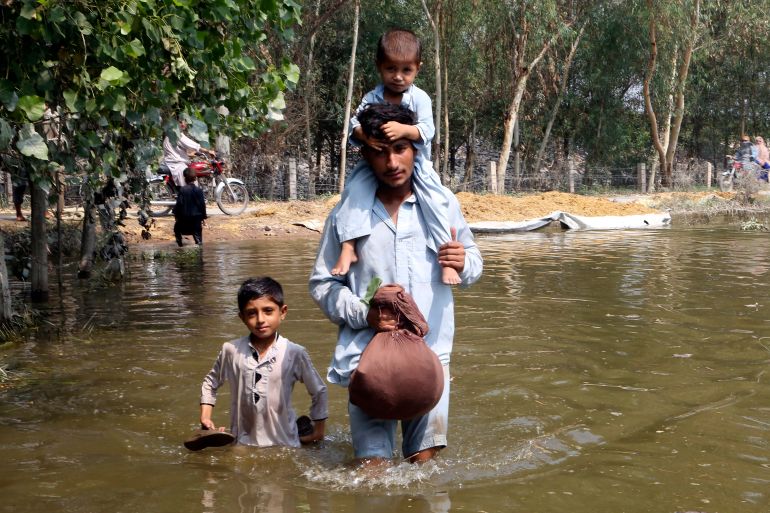UN: 10 million lack safe water six months after Pakistan floods
Families living in flood-affected areas have ‘no alternative but to drink and use potentially disease-ridden water’, UNICEF says.

About six months after catastrophic floods in Pakistan, more than 10 million people still lack access to safe drinking water in areas affected by the record-breaking rains, according to a United Nations report.
Families living in flood-hit areas have “no alternative but to drink and use potentially disease-ridden water”, the UN children’s agency, or UNICEF, said in the report on Tuesday.
Keep reading
list of 3 items‘Left with nothing’: Record floods devastate Pakistan province
Why has Pakistan not recovered from its catastrophic floods?
“Every day, millions of girls and boys in Pakistan are fighting a losing battle against preventable waterborne diseases and the consequential malnutrition,” said Abdullah Fadil, UNICEF’s representative in Pakistan.
Pakistan’s worst floods began in June due to heavy rains. They killed at least 1,739 people, including 647 children, and affected 33 million people.
At their peak, the floods – caused by a “monsoon on steroids”, as described by UN chief Antonio Guterres – submerged more than one-third of the country.
According to UNICEF’s report, a majority of the country’s population did not have access to clean drinking water even before the floods. The disaster then caused damage to most of the water systems in affected areas and forced more than 5.4 million people, including 2.5 million children to “solely rely on contaminated water from ponds and wells”.
“Only 36 percent of the country’s water was considered safe for consumption despite the country’s drinking water supply system covering 92 per cent of the population,” the report said.
6 months after the floods ravaged Pakistan, 9.6 million children still need lifesaving support. We need the continued support of our donors to provide safe drinking water, build toilets and deliver vital sanitation services to these children and families who need them the most. pic.twitter.com/Yfi90CxYgO
— UNICEF Pakistan (@UNICEF_Pakistan) March 21, 2023
The report highlighted the dire situation faced by families who live close to bodies of stagnant water formed after the flooding, making them vulnerable to waterborne diseases such as cholera, diarrhoea, dengue and malaria. These diseases prevent children from getting the vital nutrients they need and plunges them into a “a vicious cycle of malnutrition and infection”.
UNICEF said malnutrition is associated with half of all child deaths in Pakistan. More than 1.5 million boys and girls are already severely malnourished, it said, and those numbers are expected to rise in the absence of safe water and proper sanitation.
“Open defecation has increased by more than 14 percent in the flood-affected regions,” the report said. “The lack of proper toilets is disproportionally affecting children, adolescent girls and women who are at added risk of shame and harm when defecating outdoors.”
The agency said less than half of its $173m appeal for aid has been met so far.
Pakistan was hit by financial losses of at least $30bn due to the floods. In January, the country managed to secure more than $10bn in pledges from the international community to rebuild itself.
But it is also in the midst of economic turmoil as it waits for $1.1bn from the International Monetary Fund.
“We need the continued support of our donors to provide safe water, build toilets and deliver vital sanitation services to these children and families who need them the most,” Fadil said.